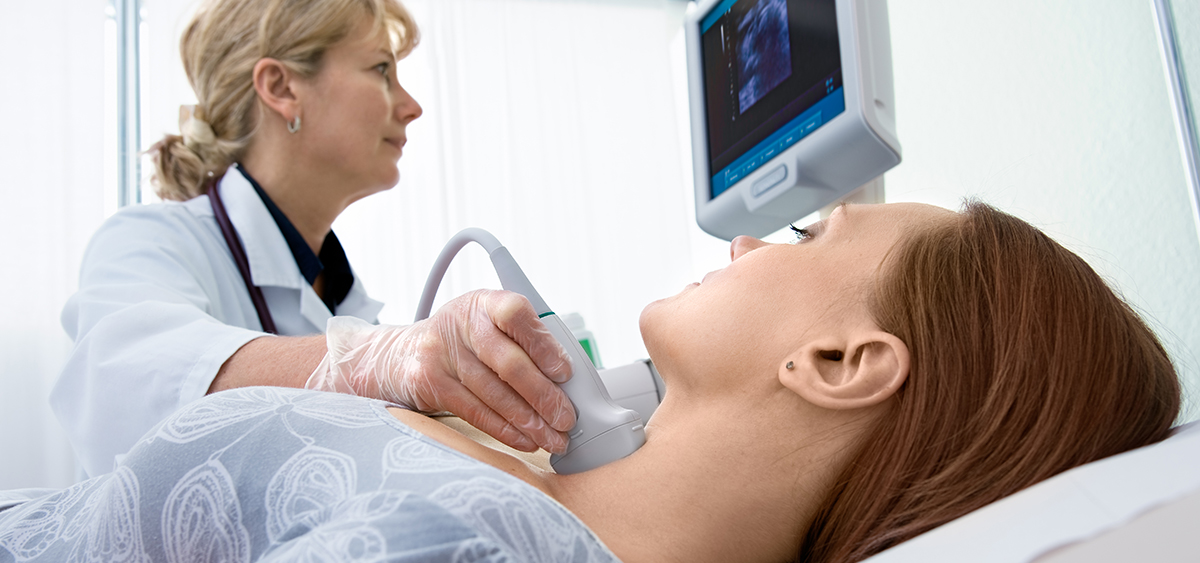
Thyroid Nodules: What You Should Know
-
Anytime a lump is discovered on your body, it can be scary. But for many people, lumps, or nodules, on the thyroid – the small, butterfly-shaped gland located at the base of the neck– are not so unusual.
Thyroid nodules are more common in women. In fact, almost half of women over the age of 50 have a thyroid nodule and the likelihood of developing one increases with age, said Dr. Colleen Veloski, chief of the Section of Endocrinology at Fox Chase Cancer Center.
Thyroid nodules generally do not cause symptoms and usually are found during a routine physical exam when the thyroid is felt by a physician.
“It’s not at all unusual for people, especially women, to have benign thyroid nodules,” Dr. Veloski said. “A lot of people are scared to have a mass anywhere, which is understandable. But with thyroid nodules, there’s no reason to panic.”
Most thyroid nodules are benign and in many cases, an endocrinologist like Dr. Veloski can look at images from an ultrasound of the thyroid and determine if a biopsy should be done or if the nodule just needs to be monitored.
Oftentimes, thyroid nodules can be monitored with ultrasounds. And since nodules are often slow growing, if there is little change shown on ultrasounds, patients may only need to be monitored for a few years.
Getting a biopsy
In some cases, your endocrinologist may recommend a biopsy, but there’s still no reason to panic and make any rash decisions, Veloski said. At Fox Chase, doctors often coordinate it so that patients can come in for their first appointment and get their biopsy on the same day, reducing wait time and the nerves that can come with waiting for a test.
Only about five to 10 percent of biopsies come back as suspicious or malignant, and require surgery, while about 70 percent come back as benign. The rest fall into a third category, endocrinologists refer to as “indeterminate.”
And while common practice used to be that indeterminate thyroid nodules would be automatically referred to surgery, molecular testing has made possible for doctors to better determine if surgery is necessary. Now, only about half of the people with indeterminate results need to have surgery.
If You Need Surgery
If your endocrinologist recommends surgery, the odds are still in your favor. Many surgeons will avoid removing the whole thyroid if possible, working to preserve as much function as possible. Some patients may need thyroid hormone therapy after surgery to remove one of the two lobes of the thyroid, but the majority of patients don’t. Even if the whole thyroid gland is removed, thyroid hormone replacement medication is effective and easy to take.
Finding a Surgeon
“Where you start your care and treatment really makes a difference, and finding a surgeon with experience is crucial,” Veloski said. Thyroid surgery outcomes are best when performed by a surgeon who operates on thyroids a lot.
But before you meet with any surgeon or even schedule a biopsy, Dr. Veloski urges all patients to see an endocrinologist who can explain different treatment options based on your individual needs.
“It’s better to wait and do the right thing than make any knee-jerk decisions that can’t be undone,” she said. “There’s no rush. We want to make sure we are creating the right course of treatment for you.”
Find out more about the Endocrinology Team at Fox Chase Cancer Center.
